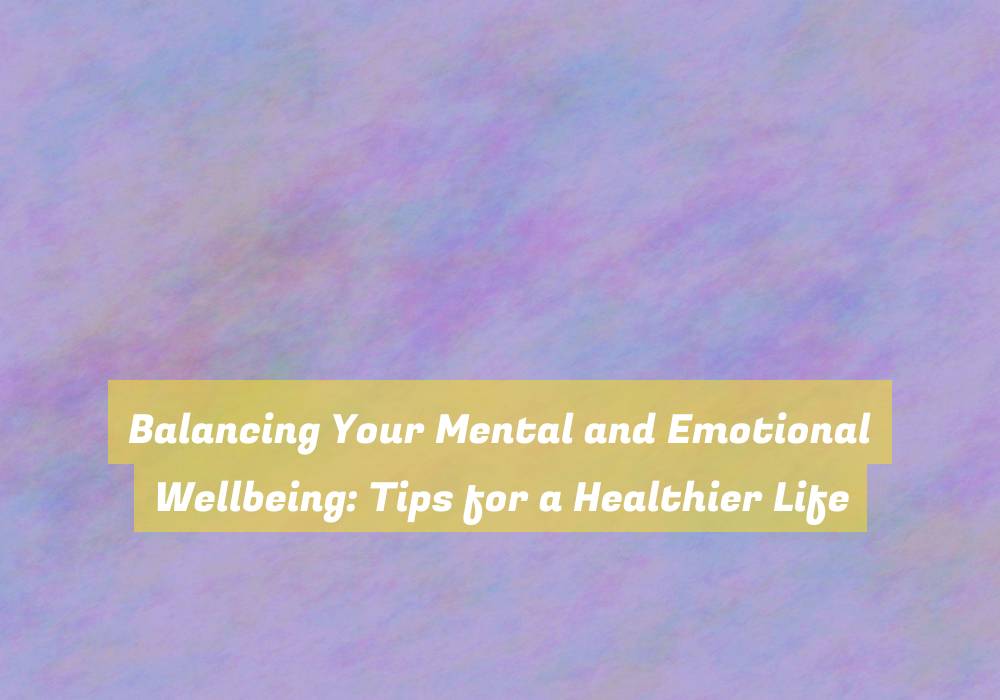Balancing Your Mental and Emotional Wellbeing: Tips for a Healthier Life
Imagine your mind as a garden that requires careful tending and nurturing to flourish. Just as a garden needs sunlight, water, and attention to thrive, so too does your mental and emotional wellbeing.
In todayG??s fast-paced world, itG??s easy to neglect these crucial aspects of your health, but taking the time to prioritize and care for your mental and emotional wellbeing can lead to a more balanced and fulfilling life.
Understanding Mental Wellbeing
To maintain a healthy lifestyle, itG??s important to understand your mental wellbeing and prioritize activities that support it. Your mental wellbeing encompasses your emotional, psychological, and social health. ItG??s about how you think, feel, and behave. Understanding your mental wellbeing involves recognizing your emotions, coping with stress, and building healthy relationships. Paying attention to your mental wellbeing can help you cope with everyday challenges, improve your relationships, and promote overall wellbeing.
One way to understand your mental wellbeing is by practicing mindfulness. This involves being fully present in the moment, acknowledging and accepting your feelings, thoughts, and bodily sensations without judgment. It can help reduce stress, anxiety, and depression while enhancing your overall mental resilience.
Additionally, engaging in activities that you enjoy and that bring you a sense of accomplishment can have a positive impact on your mental wellbeing. This might include hobbies, exercise, or spending time with loved ones.
Managing Emotional Stress
Feeling overwhelmed by emotional stress? ItG??s important to acknowledge and address these feelings to maintain your overall wellbeing. Start by identifying the sources of your emotional stress.
Whether itG??s work, relationships, or other factors, pinpointing the triggers can help you take targeted action. Once youG??ve identified the sources, consider making changes to reduce or eliminate them. This might involve setting boundaries, seeking support, or making lifestyle adjustments.
In addition, practicing self-care is crucial for managing emotional stress. Engage in activities that bring you joy and relaxation, such as exercise, hobbies, or spending time with loved ones. Taking care of your physical health through regular exercise and a balanced diet can also have a positive impact on your emotional wellbeing.
Furthermore, consider incorporating stress-reducing techniques into your daily routine. This could include mindfulness meditation, deep breathing exercises, or journaling. These practices can help you regulate your emotions and develop a sense of calm.
Lastly, donG??t hesitate to seek professional help if you find it challenging to manage emotional stress on your own. A mental health professional can provide valuable support and guidance to help you navigate and alleviate emotional stress. Remember, managing emotional stress is an ongoing process, so be patient and kind to yourself as you work towards a healthier, more balanced life.
Building Resilience
Once youG??ve identified and managed your sources of emotional stress, itG??s essential to focus on building resilience to better cope with future challenges. Building resilience is crucial for maintaining your mental and emotional well-being.
One way to build resilience is by nurturing a positive self-view. This involves acknowledging your strengths and abilities, and believing in your capacity to cope with stress.
Additionally, developing strong problem-solving skills can enhance your resilience. When faced with a difficult situation, try to approach it with a clear and focused mind, breaking it down into manageable steps.
Cultivating strong social connections is also a key aspect of resilience. Having a support system can provide comfort, encouragement, and practical help during tough times.
Furthermore, practicing self-care through regular exercise, healthy eating, and sufficient sleep can equip you to better handle stress.
Lastly, maintaining a hopeful outlook and finding purpose in challenging circumstances can significantly boost your resilience. By actively working on these aspects, you can strengthen your ability to bounce back from adversity and navigate lifeG??s ups and downs with greater ease.
Cultivating a Positive Mindset
Fostering a positive mindset can significantly impact your overall well-being and resilience, empowering you to navigate lifeG??s challenges with greater ease. Cultivating a positive mindset involves consciously choosing to focus on the good in every situation. ItG??s about training your mind to see the silver linings, even in difficult times. When you adopt a positive outlook, youG??re better equipped to cope with stress and adversity. This doesnG??t mean ignoring negative emotions; rather, itG??s about acknowledging them and then actively working to shift your perspective towards a more optimistic view.
One way to cultivate a positive mindset is by practicing gratitude. Taking time each day to reflect on the things youG??re grateful for can help shift your focus from whatG??s lacking to whatG??s abundant in your life.
Additionally, surrounding yourself with positive influences, whether itG??s through the company you keep or the content you consume, can also have a significant impact on your mindset.
Conclusion
Take small steps every day to prioritize your mental and emotional wellbeing.
By understanding your mental state, managing stress, building resilience, and cultivating a positive mindset, you can lead a healthier and happier life.
Remember to practice self-care, seek support when needed, and make time for activities that bring you joy.
Your mental and emotional health are just as important as your physical health, so make sure to give them the attention they deserve.






